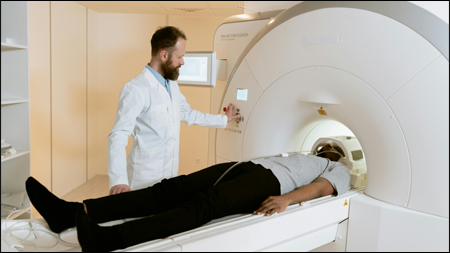Ayurvedic Insights on MRI Scan : Diagnosis, Issues & Approximate Cost
Abstract
An MRI scan is a window into the hidden architecture of the human body, capturing intricate details with breathtaking clarity. Using powerful magnetic fields and radio waves, it reveals structures unseen by the naked eye — from the soft whisper of muscle fibers to the delicate folds of the brain. Non-invasive and painless, MRI technology paints vivid images that guide diagnoses, monitor treatments, and unlock medical mysteries. Each scan is a story written in patterns of light and shadow, offering doctors a map through the complexities of illness and injury. In every pulse and echo, the future of healing takes form. Let’s discuss it in detail!

Introduction
Magnetic Resonance Imaging (MRI) is a non-invasive medical imaging technique where a strong magnetic field and radio waves are used to generate detailed, three-dimensional images of internal organs and tissue within the body, which can provide different information for a wide range of health conditions, diagnostic pieces of information for a wide range of medical conditions without the use of ionizing radiation. It is used in various conditions like monitoring the treatment and detecting abnormalities, for operations, clinical applications, and much more.
Importance
MRI has many uses according to the use it has importance like –
- Soft tissue imaging – MRI scan helps in soft tissue imaging like muscles, ligaments, and tendons, injury, any atrophy, and any damage to a particular part.
- In heart imaging – MRI can help evaluate the heart’s functioning and anatomy of the heart, and can help diagnose cardiovascular diseases.
- Brain imaging – MRI can help differentiate between white and gray matter in the brain and help in diagnosing tumors, infarcts, pneumocephalus, an Aerocele in the brain, and hemorrhage.
- Abdominal imaging – MRI can be used for the diagnosis of cirrhosis, and ascites, to visualize the liver, kidney, pancreas, or other organs of the abdomen, and their tissues and any deformity of the tissues.
Diagnosis
MRI is a screening test that is used to diagnose various diseases. Some organs and diagnosis of diseases in the organs are
- Brain – Tumors, both cancerous and non-cancerous tumors can be detected with an MRI. Bleeding in the brain tissues, subarachnoid, subdural, and epidural bleeding can be seen, as aneurysms, infections, multiple sclerosis (scar tissues that result from damage to the myelin sheath in the brain), stroke, brain injury, dementia, hormonal disorders like acromegaly, Cushing syndrome, galactorrhea.
- Bones – MRI of bones or joints can help in diagnosing and showing a clear picture of the dislocated joint, fractured bone, infections, tumors, torn ligaments, tendons, or cartilage, and degenerative joint problems.
- Soft tissue – MRI can help in diagnosing a variety of conditions that affect soft tissues, including tumors, injuries, and other abnormalities like angiomyomas, and other malignant and benign tumors, herniation, inflammatory diseases, congenital abnormalities, and osteonecrosis.
- Liver – Diagnosis of different diseases of the liver like cirrhosis, hepatitis, cancer, fatty liver, any gallstones, or obstruction in the bile duct, etc.
- Pancreas – MRI can diagnose different pancreas diseases like pancreatitis, pancreatic cancer, gallstones, and vascular abnormalities.
- Kidney – In MRI we can check the tumors in the kidney, any inflammation, or any scarring of tissues of the kidney.
- Spleen – Splenomegaly, tumors of the spleen, infarction, lymphoma, infection, metastatic diseases (cancer that can spread to another part of the body).
- Uterus, ovaries, and fallopian tube – Diagnosis of diseases such as adenomyosis, abnormalities of uterine structure, uterine fibroids, inflammation in the endometrium, cyst or abscess in the ovary or the fallopian tube or in the uterus.
- Prostate – The presence of cancer within the gland, any prostatomegaly, and any infection of the prostate, any abnormalities, can also be seen in MRI.
When Is An MRI Scan Recommended?
A MRI scan is advised when a doctor needs detailed images of soft tissues in the body, like muscles, ligaments, tendons, nerves, and organs, to diagnose conditions like tumors, injuries, spinal cord abnormalities, brain disorders, joint issues, or internal organ problems. It is recommended for the clear imaging of the organ or the part, it shows the deep and classified view of the part with the involvement of anything in it, which can’t be seen in an X-ray, in a CT scan, or ultrasound.
Which Body Can Be Seen In An MRI?
In MRI we can visualize most of the organs like the brain, neck, spine, abdomen, spleen, liver, kidney, intestine, stomach, gallbladder, large intestine, rectum, pancreas, urinary bladder, ureter, uterus, fallopian tube, ovaries, prostrate, lungs, joints like knee joint, shoulder joint, ligaments in the joints, adrenal gland, etc.
Issues In MRI Scan
The main issues that arise during an MRI scan are related to the strong magnetic field, which can pose problems for patients with implanted metal devices, like pacemakers, as well as potential allergic reaction, to contrast dye in certain scans, and discomfort from claustrophobia due to the enclosed space of the machine, in some cases, metal objects on the patient could also be pulled out towards the machine causing injury.
Metal implants – Magnetic field can move or damage implants medical devices like pacemakers, stents, surgical clips, or metal screws, potentially causing malfunction or tissue damage.
- Contrast dye reaction – Some can develop allergic reactions to the contrast dye injection during an MRI, causing hives, rash, dizziness, or nausea.
- Claustrophobia – Some patients can develop anxiety with claustrophobia.
- Heating effects – Long-time MRI can cause localized heating of the body, especially during long scans.
Approximate Cost
The cost of an MRI scan varies from place, city, and depends upon the facility where a patient is going for the scan. It also varies depending upon the type of scan, use of contrast, and the location. The cost ranges are
- Standard MRI scan without contrast in a major city may cost between Rs 5000 and 20,000.
- Brain MRI with contrast may cost around INR 14,000 to 15,000.
- MRI chest may cost around INR 10,000 to 11,000.
- MRI scan for the breast may cost around INR 10,000 to 11,000.
Conclusion
MRI scan is a Magnetic resonance imaging test where magnetic waves or radio waves are emitted on the body to examine the internal organs and tissues or any abnormal growth in the body without any incision. It shows a very clear image of the internal organs of the body, and various diagnoses of the diseases can be done by MRI test, or to see the treatment progress, also, any joint, ligament, tendon injury can be seen by the MRI scan. Here we discussed the importance of the MRI scan, its price, and what issues can be faced during the MRI scan, also some frequently asked questions regarding the MRI scan.
FAQ’s (Frequently asked questions)
1. How long does the MRI scan take?
MRI scans range from around 15 minutes to 2 hours, depending upon the body part that is scanned and the complexity of the imaging sequence. Period of the scan depends upon the area involved, if it’s a small area being scanned, then it takes a few minutes, and if the whole body or abdomen, or brain is involved, it takes more time.
2. What is the role of Metal objects?
Metal objects are extremely dangerous as the strong magnetic field of the machine can attract them, causing them to move violently and potentially injure the patient or anyone nearby, like dental implants, fillings, or braces the patient has, pacemakers history is to be taken and before going for MRI scan the patient should tell about any history of metal implants anywhere in body in fracture, dental, etc.
3. Will it hurt?
It’s a non-invasive scan so it’s not painful, but sometimes if contrast is needed, then only the health care provider will puncture the vein and administer the contrast for the clarity of the image.
4. Can someone take their normal medication before the scan?
Generally, patients can take his/her normal medication before a scan, unless the doctor has specifically instructed the patient, otherwise consult a doctor before.
5. What safety considerations should I take?
Inform the doctor about any metal implants, pacemakers, or other medical devices you have. Remove all metallic objects like jewelry, watches, piercings, and hair clips before the scan. Discuss any concerns about claustrophobia with the doctor.





